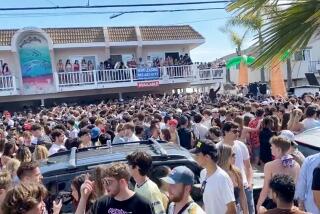Getting Away Keeps Getting Harder
- Share via
You get off work and in the parking lot discover that someone has reached up and snapped off your car antenna.
You drive home and notice that someone has sprayed graffiti onto your front wall.
You go inside and your kid finally reveals that someone stole his bike last week.
When the routine crimes of urban life begin to push you toward your red line, it’s time to get away. A week at the seashore, what could be better for the urban soul?
You throw your camping gear into the car, drive to the nearest camping beach--Doheny State Beach at Dana Point--stop at the entry kiosk, reach for the information pamphlet and . . . what’s this? Crime prevention tips? Crime?
“California’s state park system provides many unique recreational experiences, a chance to vacation, an opportunity to escape the tensions of an urban world,” it says.
“More and more, however, urban problems, including theft, are occurring within these recreational environments. Campground thefts represent a great loss, not only of property but of pleasure and enjoyment. By following a few simple precautions, you can help the park rangers greatly reduce your chances of a personal loss and provide for a more enjoyable visit to the park.”
It sounds familiar, like what the cops were saying at that Neighborhood Watch meeting last month. The brochure answers the question before you can ask it: “Some California state parks are developing Campground Watch programs similar to the Neighborhood Watch programs found in many communities.”
Then you notice for the first time that the ranger standing beside the kiosk is packing a gun.
“We don’t want to make people paranoid,” said Jerry Spansail, supervising ranger at Doheny. “I don’t want to make it sound that when you come to a park your odds of being victimized are extremely high. It’s more like going to an Angel game and one car is broken into. But if it’s your car . . . .
“We just want them to use the precautions they use at home.”
Spansail and a ranger at Lake Perris wrote the crime prevention pamphlet, and a volunteer group paid for a limited publication. Visitors began receiving them last month only at Doheny, Lake Perris, San Clemente and San Onofre state parks.
Spansail said he is not sure just when he became so concerned about crime in his park that he decided an anti-crime program was necessary. He said that as far back as 1968 park officials statewide were uneasy. Rangers, who have the training and authority of police officers, began carrying side arms in 1972.
Last year, there were two murders, two manslaughters, eight armed robberies, 19 assaults on rangers. In all, there were 2,000 crime reports in the state park system, “and that sounds low to me,” he said. Rangers unholstered their guns 88 times but did not fire a shot.
“We really haven’t that much violent crimes since I’ve been around here--about 10 years. The worst I can think of is we’ve had about three rapes. We had a body dumped from a drug overdose. We’ve been very fortunate, because the closer you are to urban areas, the higher your crime rate.”
At Doheny as well as San Clemente and San Onofre parks, crimes typically are simple thievery of property left in the open and unattended, he said.
Campers, who are in the relaxed vacation mood, simply leave things lying around. “Sometimes you can drive around and pick up an ice chest without even getting out of the car,” he said.
“There are certain things most likely to be taken--ice chests, for example, especially if there’s some beer inside. Also Coleman lanterns, surfboards or a good wet suit--things not easily traced.”
Spansail said the crimes are almost never of violence or intrusion, such as physical attacks or thieves going into even uninhabited tents. He said he thinks the park patrols keep those crimes down very well. “State parks are probably patrolled more often than your neighborhood.”
While one or two organized theft rings have operated in state parks, most of the thefts are crimes of opportunity by “somebody down on their luck and wanting some food and something they can sell to support some sort of drugs or just survival.”
You fight this kind of thievery by asking visitors to report anything suspicious, he said. Orange County parks have installed more pay telephones in the campgrounds and citizen-band radios in rangers’ cars and offices so that visitors can easily contact rangers.
If it sounds like Neighborhood Watch, it is, Spansail said. A ranger at San Onofre, Don Monahan, adapted the Neighborhood Watch idea to his park by contacting the people who were staying at the park for long periods and asking them to keep a watch on their areas. “It’s working really well,” Spansail said.
Why all this fuss over the loss of a few dollars?
“It’s amazing how many vacations are shattered,” he said. “People are just shattered when they lose a $40 ice chest.
“They wouldn’t think twice about losing $40 at Vegas, but here it’s more of an affront. It’s a special place you went to to get away from the urban ills, and when the ills catch up, you’re very upset.”
More to Read
Sign up for The Wild
We’ll help you find the best places to hike, bike and run, as well as the perfect silent spots for meditation and yoga.
You may occasionally receive promotional content from the Los Angeles Times.






